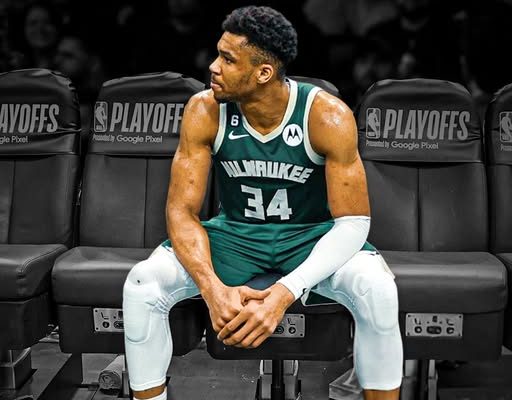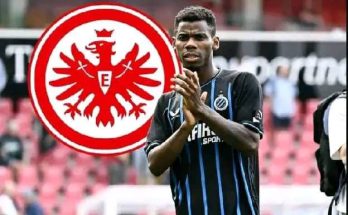Per Shams Charania, Giannis Antetokounmpo has not made any definitive decisions on his long-term plans, and that single sentence has sent a ripple of speculation through the NBA world. Whenever a player of Giannis’ caliber is mentioned in the same breath as uncertainty, fans, analysts, and executives across the league start to lean in, their ears perked up, wondering what the future might hold. Giannis is not just another All-Star or even another superstar—he is the cornerstone of the Milwaukee Bucks, a two-time MVP, NBA champion, Finals MVP, and one of the most dominant two-way forces the game has ever seen. His combination of size, speed, strength, and skill has made him the face of the franchise and arguably one of the faces of the league itself. When a player like that even hints at the possibility of change, the entire landscape of the NBA can shift in an instant.
The phrasing from Charania’s report is important because it isn’t a declaration of intent to leave, nor is it a firm commitment to stay. It’s a careful acknowledgment that Giannis is keeping his options open. In today’s NBA, this kind of openness can be strategic—it gives the player leverage over his current team while also keeping other teams intrigued. For Milwaukee, it’s both a reminder and a warning: continue to build a championship-caliber roster, keep Giannis happy, and maintain the competitive edge, because nothing is guaranteed. For rival teams, it’s an invitation to start imagining scenarios in which Giannis could be wearing a different jersey, leading their team to glory.
This moment is particularly interesting because Giannis has never been the kind of player who plays the media game or fuels rumors for the sake of drama. Since being drafted 15th overall in 2013, he has embraced Milwaukee, a small market team that believed in him when he was still a raw prospect from Greece. His loyalty has been one of his defining traits, and it has been reciprocated by the organization’s commitment to building around him. The Bucks traded for Jrue Holiday, extended Khris Middleton, and made bold moves to keep their championship window open. That 2021 title was proof that their formula worked, and it solidified Giannis’ place in NBA history. But the NBA is not static, and windows close faster than teams often expect. Injuries, age, cap constraints, and competition can all conspire to erode even the strongest contender’s chances.
The Bucks have had their share of ups and downs since that title run. They’ve dealt with playoff disappointments, coaching changes, and the challenge of keeping their supporting cast healthy and productive. Damian Lillard’s arrival before the 2023–24 season was a major swing aimed at giving Giannis the elite co-star he deserved, but integrating such a massive change takes time. The team’s performance since then has been scrutinized under a microscope, and in the NBA’s hyper-competitive Eastern Conference, even the slightest slip can lead to questions about the future. Giannis’ decision to avoid committing long-term might simply be his way of maintaining accountability within the organization. In other words, it could be less about wanting to leave and more about making sure the Bucks stay aggressive and avoid complacency.
From a player empowerment perspective, Giannis is in an enviable position. He is still in his prime, with years of elite performance ahead of him, and any team in the league would move mountains to acquire him. That leverage allows him to dictate the terms of his career—whether that’s pushing the Bucks to continue upgrading the roster or keeping open the possibility of a move if the team fails to remain competitive. In today’s NBA, superstars have realized that they no longer need to spend the entirety of their careers in one place if the conditions aren’t right. While Giannis has expressed deep affection for Milwaukee and its fans, he has also made it clear in past interviews that winning is his top priority. That mindset means his loyalty is tied to the franchise’s ability to contend for championships year after year.
For the Bucks’ front office, Charania’s report serves as both a challenge and a rallying cry. General manager Jon Horst and his staff will need to ensure that the roster around Giannis remains not just good, but elite. They’ll have to manage contracts, balance the salary cap, and make smart trades to keep the team competitive in an Eastern Conference that now includes dominant forces like the Boston Celtics, New York Knicks, and a resurgent Philadelphia 76ers. The Bucks cannot afford to take a wait-and-see approach; they have to prove to Giannis in real time that staying in Milwaukee gives him the best chance to win more titles.
Meanwhile, around the league, executives will be quietly (and maybe not so quietly) preparing for the possibility—however small—that Giannis becomes available. Teams like the Miami Heat, Golden State Warriors, and even the Los Angeles Lakers have historically been aggressive in pursuing top-tier talent, and if Giannis were to signal any openness to a trade, the offers would be astronomical. The combination of his talent, work ethic, and marketability makes him one of the most valuable players in NBA history. Even if a trade is not on the immediate horizon, the mere fact that his future is “undecided” will encourage rival teams to keep lines of communication open with the Bucks and Giannis’ camp.
For fans in Milwaukee, this news is a mix of anxiety and cautious optimism. On one hand, Giannis has always spoken warmly about his adopted city, the fans, and the life he has built there with his family. On the other hand, the NBA is a business, and sentimentality often takes a back seat to winning and legacy. Giannis knows that his prime years are limited, and he will want to maximize them by competing for titles. The Bucks have delivered before, but repeating that level of success is never guaranteed.
There’s also the reality that media speculation can sometimes take on a life of its own. A single report can snowball into daily debates on sports talk shows, social media campaigns by rival fanbases, and endless “what if” trade scenarios. Giannis is undoubtedly aware of this dynamic, which is why his public comments have generally been measured and focused on the present. By not making a definitive decision now, he retains flexibility, keeps the pressure on the Bucks, and avoids locking himself into a situation that might change over the next year or two.
In many ways, Giannis’ current stance mirrors the approach taken by other modern superstars like LeBron James, Kevin Durant, and Kawhi Leonard. These players have all demonstrated the value of short-term contracts or non-committal statements, allowing them to adapt to changing circumstances. For Giannis, the decision may ultimately come down to whether he believes the Bucks can sustain a championship-level roster in the long run. If they can, there is every reason to believe he will remain the face of Milwaukee basketball. If not, history suggests that even the most loyal superstars are not immune to seeking new opportunities.



